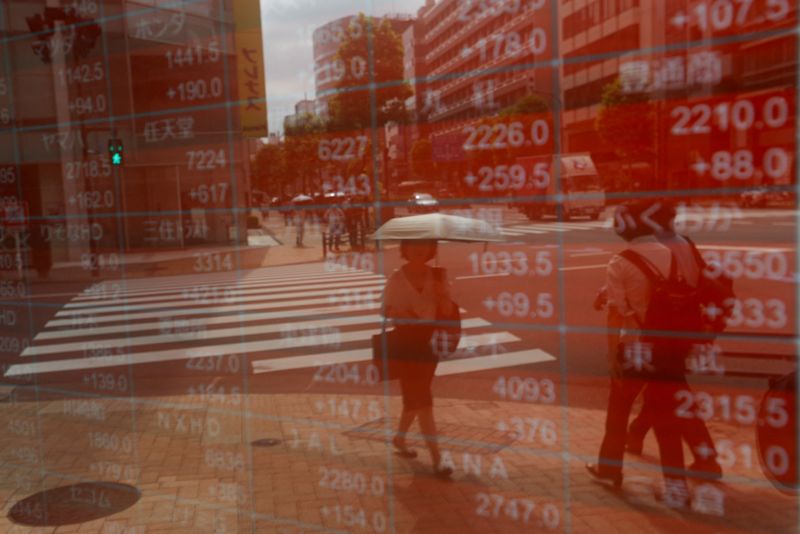European shares nudge higher, dollar steadies before megacap earnings, jobs data
By Samuel Indyk and Kevin Buckland
LONDON (Reuters) - European shares edged higher on Tuesday as investors girded for three days of megacap tech earnings reports on Wall Street, while the dollar held near a three-month high before key labour market data.
The yen found its footing following Monday's dip to a three-month low as the coalition government's drubbing in weekend elections clouded the outlook for Japanese fiscal and monetary policies. The Nikkei index recovered from a cautious start to build on the previous session's gains.
The U.S. election has entered its final stretch, with opinion polls still too close to call a winner, despite some betting sites and financial markets leaning toward a win for Republican Donald Trump over Democrat Kamala Harris.
"Markets are in a positive mood, and seem to be immune to event risk," said Kathleen Brooks, research director at XTB.
The pan-European STOXX 600 index was up 0.3%, hitting a more than one-week high.
Germany's DAX , Britain's FTSE 100 and France's CAC 40 were up between 0.4%-0.6%.
In Asia, Japan's Nikkei ended the day up 0.8%, building on its 1.8% rally in the previous session. It started the day down 0.2%.
Hong Kong's Hang Seng was 0.5% higher, paring earlier gains of as much as 1.6%. Mainland Chinese blue chips slipped 1%, reversing an early rise of 0.68% as investors eyed a top leadership meeting next week for more details of Beijing's stimulus measures.
U.S. S&P 500 futures were up slightly after the cash index gained 0.3% on Monday.
The bulk of the "Magnificent Seven" group of megacap technology stocks that have driven Wall Street to all-time highs this year report financial results this week. Alphabet (NASDAQ:GOOGL ) kicks things off later on Tuesday before earnings from Meta Platforms (NASDAQ:META ) and Microsoft (NASDAQ:MSFT ) are due on Wednesday, followed by Apple (NASDAQ:AAPL ) and Amazon (NASDAQ:AMZN ) on Thursday.
DOLLAR NEAR 3-MONTH PEAK
The dollar was little changed against a basket of six major peers, which includes the yen and euro. The dollar index stood at 104.24, after reaching 104.57 on Monday, matching the high from Wednesday of last week, a level previously not seen since July 30.
Recent robust U.S. economic data, including evidence of a resilient job market, have prompted a scaling back of bets on further Federal Reserve easing this year, boosting the dollar.
One of the Federal Reserve's preferred employment gauges - the JOLTs job openings report - is due on Tuesday, ahead of highly anticipated monthly nonfarm payrolls data on Friday.
The U.S. currency has also been buoyed by rising market expectations for an election win for Trump, whose tariff, tax and immigration policies are seen as inflationary, thus negative for bonds and positive for the dollar.
Ten-year U.S. Treasury yields rose to 4.314% on Tuesday, the highest since July 11.
"Markets have started to care more about the election," said Nordea's von Gerich.
"Clearly Trump has gained in the polls and even more in the betting odds and we're seeing that in a stronger dollar and higher rates."
The dollar rose 0.1% to 153.415 yen, just below Monday's 153.885, its highest since July 31.
In Japan, a period of wrangling to secure a coalition is likely after Prime Minister Shigeru Ishiba's Liberal Democratic Party and its junior partner Komeito lost their majority in parliament, in a scathing result that potentially means bigger fiscal spending and complicates the Bank of Japan's push to normalise interest rates.
The head of the opposition Democratic Party for the People said on Tuesday that the central bank should avoid making big changes in its ultra-loose monetary policy because real wage growth remains at a standstill.
The BOJ next decides policy on Thursday, with no change expected.
The euro held steady at $1.0824, and sterling stood at $1.2984.
Gold rose 0.39% to $2,753 an ounce, pushing up towards the record high of $2,758.37 from last week.
Brent crude futures rose to $71.90 a barrel, while U.S. West Texas Intermediate crude was at $67.83 a barrel. Both contracts tumbled 6% on Monday, hitting their lowest since Oct. 1, after Israeli strikes on Iran at the weekend avoided oil infrastructure.
Source: Investing.com
